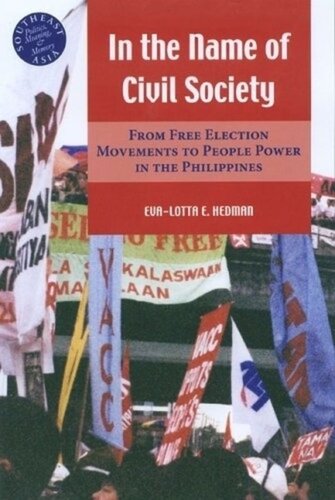

Most ebook files are in PDF format, so you can easily read them using various software such as Foxit Reader or directly on the Google Chrome browser.
Some ebook files are released by publishers in other formats such as .awz, .mobi, .epub, .fb2, etc. You may need to install specific software to read these formats on mobile/PC, such as Calibre.
Please read the tutorial at this link: https://ebookbell.com/faq
We offer FREE conversion to the popular formats you request; however, this may take some time. Therefore, right after payment, please email us, and we will try to provide the service as quickly as possible.
For some exceptional file formats or broken links (if any), please refrain from opening any disputes. Instead, email us first, and we will try to assist within a maximum of 6 hours.
EbookBell Team

4.4
102 reviews"In the Name of Civil Society examines Philippine politics in a highly original and provocative way. Hedman’s detailed analysis shows how dominant elites in the Philippines shore up the structures of liberal democracy in order to ensure their continued hegemony over Philippine society. This book will be of interest to everyone concerned with civil society and the processes of democratization and democracy in capitalist societies." —Paul D. Hutchcroft, University of Wisconsin, Madison
What is the politics of civil society? Focusing on the Philippines—home to the mother of all election-watch movements, the original People Power revolt, and one of the largest and most diverse NGO populations in the world—Eva-Lotta Hedman offers a critique that goes against the grain of much other current scholarship. Her highly original work challenges celebratory and universalist accounts that tend to reify "civil society" as a unified and coherent entity, and to ascribe a single meaning and automatic trajectory to its role in democratization. She shows how mobilization in the name of civil society is contingent on the intercession of citizens and performative displays of citizenship—as opposed to other appeals and articulations of identity, such as class. In short, Hedman argues, the very definitions of "civil" and "society" are at stake. Based on extensive research spanning the course of a decade (1991–2001), this study offers a powerful analysis of Philippine politics and society inspired by the writings of Antonio Gramsci. It draws on a rich collection of sources from archives, interviews, newspapers, and participant-observation. It identifies a cycle of recurring "crises of authority," involving mounting threats—from above and below—to oligarchical democracy in the Philippines. Tracing the trajectory of Gramscian "dominant bloc" of social forces, Hedman shows how each such crisis in the Philippines promotes a countermobilization by the "intellectuals" of the dominant bloc: the capitalist class, the Catholic Church, and the U.S. government. In documenting the capacity of so-called "secondary associations" (business, lay, professional) to project moral and intellectual leadership in each of these crises, this study sheds new light on the forces and dynamics of change and continuity in Philippine politics and society.